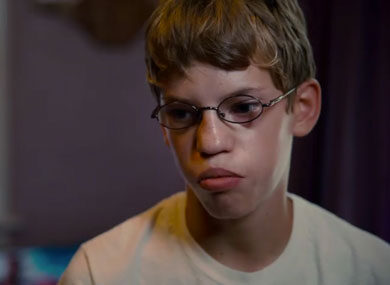Whether you think bullying is a recent cultural phenomenon, or one that simply reflects human nature and has been around for thousands of years, the reality shown in Lee Hirsch’s heartbreaking documentary Bully, is devastating. It is one thing to read about incidents of bullying and teen suicides, but when a face is put to the story, its impact takes on an entirely new dimension. Hirsch’s documentary focuses on three young students who have been subjected to merciless verbal and physical attacks during the school year and on the parents of two victims who committed suicide as the only way they could see to end their torment.
The film opens with a look at the grieving parents of Tyler Long of Murray County, Georgia watching home videos of their son when he was a little boy. His father David says that as Tyler became older he became more and more introverted and that they only became aware of the extent to which he was bullied after his suicide at the age of seventeen. There is no mention of whether or not he was gay but the implication cannot be denied. The Longs have become activists, organizing town meetings to let other parents know how the school system failed in its responsibility to protect their son.
In another tragic situation, we see Kirk and Laura Smalley of Perkins, Oklahoma as they attend the funeral of their eleven-year-old son Ty who committed suicide after being relentlessly bullied for a long time. Like the parents of Tyler Long, The Smalley’s take action by creating an organization called “Stand for the Silent” devoted to the prevention of bullying. Hirsch, who says he was bullied as a young man, also lets the viewer witness school bullying as it takes place, captured by a hidden camera. In one of the more disturbing sequences, on a school bus Alex, a 12-year-old boy from Sioux City, Iowa who was born prematurely, is verbally harassed (called “fish-face,” among other names), punched and choked while the bus driver continues the ride without so much as blinking an eye.
During school hours, Alex is without friends and wanders around aimlessly during recess. His father, unaware of the real fear their son has, urges him to fight back. When the threats against Alex become unbearable, Hirsch shows the footage he shot to Alex’s parents, the police, and the school administrators (the principal and vice-principal tell him that it will be dealt with but it is obvious that it their words are just empty reassurance). There’s also 14-year-old Ja’Maya from Yazoo County, Mississippi who was sentenced to a term in juvenile hall for confronting her bullies with a loaded gun on their school bus. Though she and her mother know that she made a mistake that will give her a criminal record, she claims that she was driven to take such drastic action because no one listened to her.
Another victim of bullying is Kelby, a sixteen-year-old girl from a small town in Oklahoma who describes herself as a lesbian. She was a star athlete, but when she came out, she was kicked off the team. In her classroom she is treated as an outcast with students around her moving when she sits down. Though her father says he is willing to move, Kelby refuses to leave her hometown because she thinks it would be a signal to the bullies that they have won.
Though it will not stop the attacks, Bully can offer hope to those who feel alone and helpless (it has launched an active Internet campaign to enlist community support against bullying). And even though it is difficult to watch and the tears may flow, Bully should still be seen by everyone — kids, parents, administrators and yes, bus drivers. (Originally rated R, after much protest, the film’s rating has been changed to PG-13).






'Movie Review: Bully (2011)' has 1 comment
July 14, 2012 @ 7:10 am Lawrence
Bullying has always been a part of growing up – there will always be the schoolyard bully. I can’t understand why all this “no tolerance” legislative bullshit is being introduced. You can’t write a law to stop it …
Kids need to stand up for themselves – this is becoming a nation of pussies …